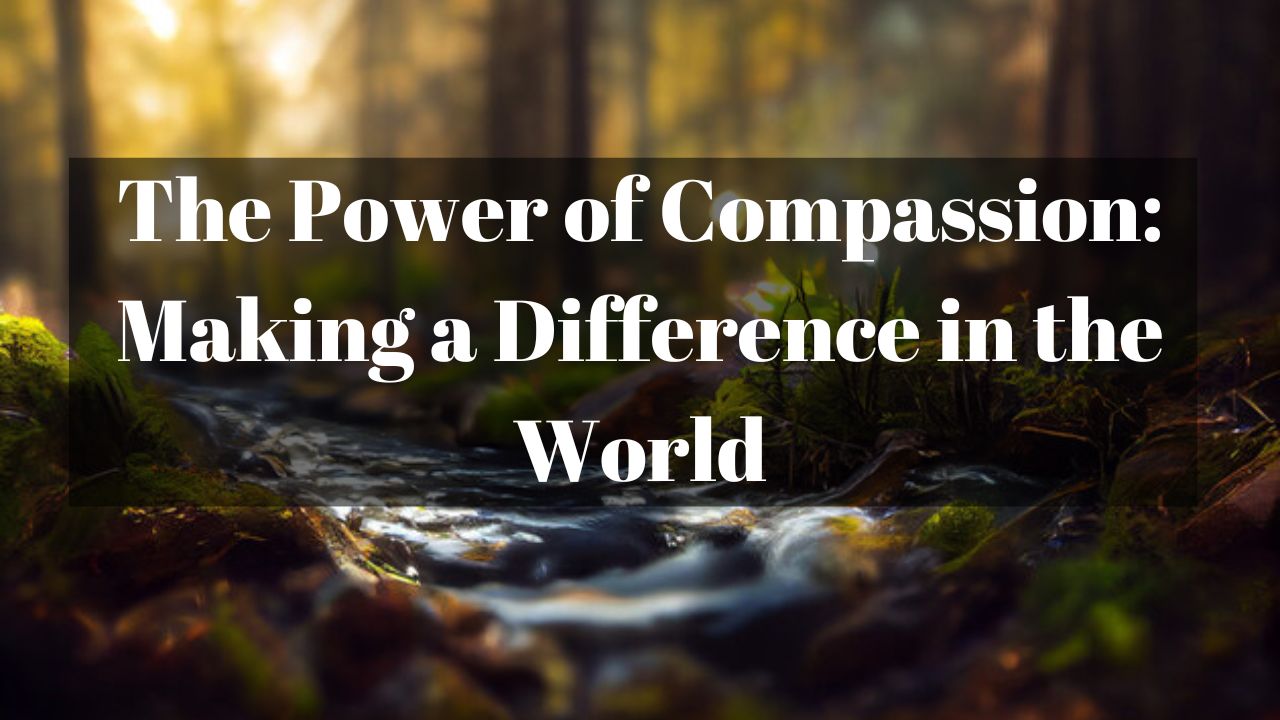The Power of Compassion: Making a Difference in the World
In a world often marked by challenges and disparities, the power of compassion stands as a beacon of hope, capable of transforming lives and making a significant difference. Compassion, a deeply empathetic response to the suffering of others, transcends cultural and societal boundaries. In this article, we will explore the profound impact of compassion, not only on individuals but also on communities and the world at large.
Understanding Compassion:
Compassion is more than a fleeting feeling of sympathy; it is an active force that propels individuals to alleviate the suffering of others. Rooted in empathy, compassion fosters a connection between people, breaking down barriers and fostering a sense of shared humanity. It is the recognition that, despite our differences, we all share in the human experience.
Individual Empowerment through Compassion:
The power of compassion lies in its ability to empower individuals to make a positive impact. Acts of kindness, whether big or small, ripple through communities, creating a collective force for good. From lending a helping hand to a neighbor in need to participating in volunteer initiatives, individuals can harness the transformative power of compassion in their daily lives.
Building Stronger Communities:
Compassion is the glue that binds communities together. When individuals within a community embrace a compassionate mindset, a culture of support and mutual care emerges. This, in turn, creates a resilient and interconnected community that is better equipped to face challenges and uplift its members during difficult times.
Addressing Social Issues:
Compassion serves as a catalyst for addressing systemic issues and social injustices. Those who feel a deep sense of empathy are more likely to take action to address the root causes of societal problems. By raising awareness, advocating for change, and supporting initiatives that promote equality, compassionate individuals contribute to the larger movement for a fair and just society.
Compassion in Leadership:
Leaders who lead with compassion inspire and motivate their teams to achieve greatness. Compassionate leadership involves understanding the needs and challenges of others, fostering a positive work environment, and prioritizing the well-being of team members. Such leaders create a culture of trust, collaboration, and innovation, ultimately driving success on both individual and organizational levels.
Global Impact of Compassionate Initiatives:
The power of compassion extends beyond local communities to have a global impact. International humanitarian efforts, charitable organizations, and grassroots movements driven by compassion address global challenges, such as poverty, hunger, and health crises. Compassionate initiatives bring people together from different corners of the world to work towards shared goals of creating a better future for all.
Educating for Compassion:
Instilling the value of compassion in education is crucial for shaping future generations. Educational institutions play a vital role in teaching empathy, kindness, and the importance of understanding diverse perspectives. By fostering a compassionate mindset in young minds, we ensure that the power of compassion continues to shape the world positively for years to come.
Mindfulness and Compassion:
Mindfulness practices, such as meditation and reflective exercises, can enhance one’s capacity for compassion. By cultivating mindfulness, individuals become more attuned to their emotions and better equipped to respond with empathy to the struggles of others. Integrating mindfulness into daily routines contributes to a more compassionate and connected world.
Overcoming Barriers with Compassion:
Compassion has the potential to overcome divisions and foster unity. Whether bridging gaps between different cultures, religions, or socio-economic backgrounds, compassionate interactions promote understanding and dissolve prejudices. By focusing on shared human experiences, compassion becomes a powerful force for breaking down barriers that divide societies.
Self-Compassion and Well-being:
It’s essential to extend compassion not only to others but also to oneself. Self-compassion involves treating oneself with the same kindness and understanding offered to others. Cultivating self-compassion contributes to improved mental well-being, resilience in the face of challenges, and a greater capacity to contribute positively to the world.
Inspiring Acts of Kindness:
Acts of kindness, fueled by compassion, have the power to create a domino effect of positivity. From paying it forward at a coffee shop to engaging in random acts of kindness, these gestures inspire others to follow suit. The cumulative impact of small acts of compassion can create a wave of positive change, both locally and globally.
Sustainability and Compassion:
The future of our planet relies on compassionate stewardship of the environment. Recognizing the interconnectedness of all living things, compassionate individuals and organizations are at the forefront of sustainable practices. From reducing carbon footprints to advocating for conservation efforts, compassion plays a pivotal role in fostering a harmonious relationship between humanity and the Earth.
Conclusion:
The power of compassion transcends individual acts of kindness; it has the potential to shape a more empathetic, just, and interconnected world. From fostering strong communities to addressing global challenges, compassion serves as a catalyst for positive change. As individuals, communities, and societies, embracing compassion is not just a choice; it is a responsibility—a commitment to creating a world where the well-being of all is prioritized. In the art of making a difference, compassion is the brushstroke that paints a brighter and more inclusive future for generations to come.











